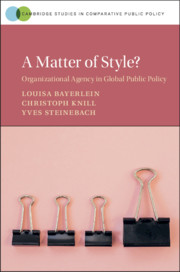Crossref Citations
This Book has been
cited by the following publications. This list is generated based on data provided by Crossref.
Thorvaldsdottir, Svanhildur
and
Patz, Ronny
2021.
Explaining sentiment shifts in UN system annual reporting: a longitudinal comparison of UNHCR, UNRWA and IOM.
International Review of Administrative Sciences,
Vol. 87,
Issue. 4,
p.
794.
Busch, Per-Olof
Feil, Hauke
Heinzel, Mirko
Herold, Jana
Kempken, Mathies
and
Liese, Andrea
2021.
Policy recommendations of international bureaucracies: the importance of country-specificity.
International Review of Administrative Sciences,
Vol. 87,
Issue. 4,
p.
775.
Heinzel, Mirko
and
Liese, Andrea
2021.
Managing performance and winning trust: how World Bank staff shape recipient performance.
The Review of International Organizations,
Vol. 16,
Issue. 3,
p.
625.
Thorvaldsdottir, Svanhildur
Patz, Ronny
and
Eckhard, Steffen
2021.
International bureaucracy and the United Nations system: introduction.
International Review of Administrative Sciences,
Vol. 87,
Issue. 4,
p.
695.
Heinzel, Mirko
and
Liese, Andrea
2021.
Expert authority and support for COVID-19 measures in Germany and the UK: a survey experiment.
West European Politics,
Vol. 44,
Issue. 5-6,
p.
1258.
Steinebach, Yves
and
Knill, Christoph
2022.
Comparative Studies of Public Administration and Public Policy beyond the Nation State.
Journal of Comparative Policy Analysis: Research and Practice,
Vol. 24,
Issue. 3,
p.
201.
Heinzel, Mirko
2022.
International Bureaucrats and Organizational Performance. Country-Specific Knowledge and Sectoral Knowledge in World Bank Projects.
International Studies Quarterly,
Vol. 66,
Issue. 2,
Mettang, Olivia
2022.
Street-Level Workers as Institutional Entrepreneurs.
p.
9.
Jankauskas, Vytautas
2022.
Delegation and stewardship in international organizations.
Journal of European Public Policy,
Vol. 29,
Issue. 4,
p.
568.
Heinzel, Mirko
2022.
Mediating power? Delegation, pooling and leadership selection at international organisations.
The British Journal of Politics and International Relations,
Vol. 24,
Issue. 1,
p.
153.
Heinzel, Mirko
2022.
Divided loyalties? The role of national IO staff in aid‐funded procurement.
Governance,
Vol. 35,
Issue. 4,
p.
1183.
Lischewski, Isabel
2022.
Lawful by Design.
Ege, Jörn
Bauer, Michael W.
Bayerlein, Louisa
Eckhard, Steffen
and
Knill, Christoph
2022.
Avoiding disciplinary garbage cans: a pledge for a problem-driven approach to researching international public administration.
Journal of European Public Policy,
Vol. 29,
Issue. 7,
p.
1169.
Busch, Per-Olof
Heinzel, Mirko
Kempken, Mathies
and
Liese, Andrea
2022.
Mind the Gap? Comparing De Facto and De Jure Expert Authority of International Public Administrations in Financial and Agricultural Policy.
Journal of Comparative Policy Analysis: Research and Practice,
Vol. 24,
Issue. 3,
p.
230.
Patz, Ronny
Thorvaldsdottir, Svanhildur
and
Goetz, Klaus H
2022.
Accountability and Affective Styles in Administrative Reporting: The Case of UNRWA, 1951–2020.
Journal of Public Administration Research and Theory,
Vol. 32,
Issue. 1,
p.
111.
Bayerlein, Louisa
Kaplaner, Constantin
Knill, Christoph
and
Steinebach, Yves
2022.
Singing Together or Apart? Comparing Policy Agenda Dynamics within International Organizations.
Journal of Comparative Policy Analysis: Research and Practice,
Vol. 24,
Issue. 3,
p.
210.
Fleischer, Julia
and
Buzogány, Aron
2023.
Unboxing International Public Administrations: The Politics of Structural Change in the UN System (1998–2019).
The American Review of Public Administration,
Vol. 53,
Issue. 1,
p.
23.
Schuette, Leonard
and
Dijkstra, Hylke
2023.
When an International Organization Fails to Legitimate: The Decline of the OSCE.
Global Studies Quarterly,
Vol. 3,
Issue. 4,
Casula, Mattia
and
Malandrino, Anna
2023.
Exploring the link between administrative styles and policy output: The case of the Italian Extraordinary Commissioner for the Covid‐19 Emergency.
European Policy Analysis,
Vol. 9,
Issue. 2,
p.
119.
Schuette, Leonard August
2023.
Shaping institutional overlap: NATO’s responses to EU security and defence initiatives since 2014.
The British Journal of Politics and International Relations,
Vol. 25,
Issue. 3,
p.
423.



